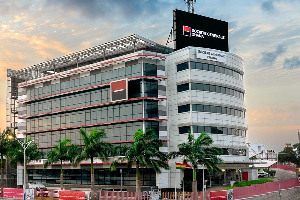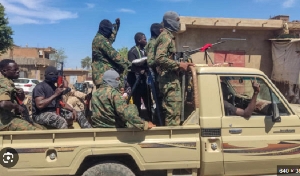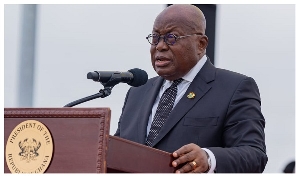- Home - News
- TWI News | TV
- Polls
- Year In Review
- News Archive
- Crime & Punishment
- Politics
- Regional
- Editorial
- Health
- Ghanaians Abroad
- Tabloid
- Africa
- Religion
- Election 2020
- Coronavirus
- News Videos | TV
- Photo Archives
- News Headlines
- Press Release
General News of Friday, 21 June 2002
Source: Network Herald
We live in worse conditions than Pigs - Ala Adjetey
The Honourable Speaker of Parliament Peter Ala Adjetey has described the living conditions of the majority of Ghanaians hopelessly pathetic; pointing out that in some cases, "the conditions in which some of our people work, eat and sleep are worse than the conditions of pigs or other low class animals in some countries".
Making a presentation at a Ghana-Canada Parliamentary support project at Agona Swedru last Friday. Mr Ala Adjetey wondered why with such a generally hospitable landmass, Ghana should face the kind of multi-faceted economic problems that the country has to contend with. Also to him, life in this part of our world is "brutish,nasty and short" and that whether in the urban centre or the country-side, the individual's life can never be said to be characterised by a minimum of discomfort.
The Speaker who disputed the statistics of poverty level pegged at 39 per cent in 1990 and 40 per cent in 2000 with the arguement that on the ground, the actual poverty level must only be over 50 per cent contended that the majority of the people over whose parliament he is the lord, cannotbe said to be living at all but "eking out an existence , a life of wretched poverty or what the poet describes as' chill penury' ".
To him therefore, the problem confronting the country is so huge that unless we work hard to produce enough to at least feed ourselves we would never be able to earn enough to raise our living conditions and create acceptable standards of living thereby, distinguishing ourselves as human beings from the lower animals.
But the honourable Speaker would not tell how his NPP government is (will) tackle the situation. He only lamented the inability of SAP or PAMSCAD to lead us anywhere except sometimes backwards and hoped that the New Partnership for Afrcan Development NEPAD would attract sufficient levels of foreign direct investment to make a significant change to the life of squalor, misery,poverty, disease and illiteracy.
OPENING AND KEYNOTE ADDRESS DELIVERED BY THE RT. HON. MR. PETER ALA ADJETEY, SPEAKER OF PARLIAMENT AT THE WORKSHOP ON THE NATIONAL ECONOMY, POVERTY REDUCTION AND PARLIAMENT, ORGANIZED BY THE GHANA - CANADA PARLIAMENTARY SUPPORT PROJECT AT GREENLAND HOTEL, AGONA SWEDRU ON FRIDAY 14TH JUNE 2002
Hon. Members and Distinguished Delegates,
Representatives of the Parliamentary Centre - Canada,
Distinguished Representatives from various agencies, both local and external, Ladies and Gentlemen.
I must begin by thanking the organizers for inviting me to open the Workshop and in the process to deliver what has been described as a “Keynote Address” I must warn you, however, that although my presentation has been described as a “Keynote Address” you should not expect anything more than a few personal remarks on the subject-matter of the seminar or at least on an aspect of the subject-matter.
The question of the National Economy is one which will always be with us. For as long as, as a nation and as a people, we are compelled to allocate scarce resources among competing wants, we shall have- problems with our National Economy.
In this connection the world has not yet succeeded in producing the ideal State or Country which has no problem with its national economy.) It is, of course, true that circumstances in various countries I tend to exacerbate the economic problems in those countries more than in others.
In Ghana, although we are said t? be blessed with many natural resources and with a generally hospitable landmass, we have had to face very serious economic problems especially since independence.) The concern of Members of Parliament, as the representatives of the people, is to assist the Executive. Arm of Government in finding solutions to the multi-faceted economic problems that the country has to contend with.
The only real use of a Member of Parliament is that he will represent the desires and aspirations of his people at the national level so that, together I with other Members of Parliament, they may work towards the realization of such desires and aspirations. Every human being seeks to live a life of reasonable comfort and peace of mind. The Member of Parliament, therefore, has to work for his constituents in such a way as to optimize the conditions of comfort and peace of mind which every human being seeks to realize. In short, every human being would like to live a life of the greatest possible happiness and he gives authority to his Member of t”
Parliament to facilitate the attainment of this state of affairs.
The constituents of Parliamentarians will, therefore, seek to judge the usefulness of Members of Parliament on the degree to which they work to help them achieve a life of happiness and contentment or a life characterized by a minimum of discomfort.
In this country and all over Africa the lives of our people have, to quote the philosopher, been “nasty, brutish and short”. All over our country one is stared in the face by evidence of widespread poverty whether it be in the urban areas or in the countryside. In these circumstances it is impossible to say that the individual is living a life characterized by a minimum of discomfort. The very conditions in which people live are totally unacceptable and unworthy of human beings.
It is no exaggeration to say that in many cases, the conditions in which some of our people work, eat and sleep are worse than !the conditions of pigs or other low class animals in some countries.
Just look at the buildings in which! our people live, sleep reproduce and bring up their offspring. These are a crying shame. They are things we would not want to present to It is not the case that these are to be seen in a few places but these are wide spread. The percentage of our population which can be said to be living in anything approaching civilized conditions is very small indeed, so small as to be almost insignificant in many towns and cities.
We have no magnificent edifices or structures to boast about
In other countries world-wide parliament meets in magnificent structures but after forty five (45) years of independence, our Parliament still I meets in what are no better than what one may be permitted to call “borrowed buildings”. What do we as a nation have to show to the outside world, I am afraid very little and who bears the responsibility for this undignified, state of affairs? I am afraid, it is we and our ancestors.
We simply have not-achieved as much as we should have done in the past to enable us to pull ourselves by our own bootstraps and achieve a takeoff so that we shall fly as eagles, which we are and not merely feed on maize as chicken in a poultry farm.
The statistics that have been assembled with regard to our state of living bear ample testimony to the somber picture which I have, with considerable pains attempted to paint in this presentation. In the year 2000 the daily minimum wage of the average Ghanaian was quoted as four thousand two hundred and fifty cedis (?4,250). Since the rate of exchange was about four thousand cedis (?4,OOO) to a dollar, this was merely the equivalent to a dollar a day!. Now you and I know that it is simply impossible for any human being to have lived on one dollar a day in the year 2000. Such a life could only be described as a life of starvation.
Even as I speak the position is worse because the daily minimum wage is quoted as seven thousand, one hundred and fifty cedis (?7,150) and at a rate of seven thousand, eight hundred cedis to the US dollar the average worker is worse of now than he was two (2) years ago because what he earns now is far less than one dollar a day.
Statistics of poverty levels in this country which are basically, only enlightened guesswork put the :,poverty level at 40% in 1990 and 39% in 2000. Having regard to what we actually I know on the ground, these estimates may appear to be too low. The actual poverty level is believed are much higher than the 40% indicated. It will seem the level of poverty in this country is more than 50%. How is the average man and woman able to live? The answer is that the majority cannot be said to be living at all but to be eking out an existence, a life of wretched poverty or what the poet described as “chill penury”.
In the year 2001, our government decided that in view of our extreme poverty and heavy indebtedness, we should honestly and openly admit our condition and! invite the international, community to offer maximum assistance to us so that we can rise out of the quagmire of prove Fitly with which we find ourselves surrounded. A man can be poor without necessarily being also heavily indebted.
In our case it was determined that we are not only very poor but highly indebted. These were the circumstances in which the Executive Arm of Government! proposed to Parliament which Parliament approved that our country should avail itself of the facilities available from the international community to countries which declare themselves as HIPC or highly indebted poor countries. It is not a palatable situation. It is a bitter pill but if it is the truth then it has to be faced as it is said that the truth often hurts but there can be no running away from it.
The problem that confronts this nation with regard to the reduction of poverty is a huge one. It is not one for Members of Parliament or of the Executive alone to solve. It is one for the whole nation and for all of us, as a people. Unless we work hard and produce more, we would not be able to raise our standard of living. We would not be able to earn enough to make our living conditions tolerable. We would not be able to provide our people with the good things of life. We would not be able to distinguish ourselves as human beings from; the lower animals and-which should justify any claim by us that we are living In civilized conditions.
We have tried the SAP – Structure Adjustment Programme and when it was considered that this programme lacked a human face, we tried to remove some of the harsh effects of the SAP by what was referred to by the long acronym, PAMSCAD or Programme of Action to Mitigate the Social costs of Adjustment. All these have landed us nowhere except sometimes backwards.
Now we have entered or are entering the era of NEPAD or New Partnership for Africa Development. We have put great hopes on NEPAD and we can only pray that what became the! lot of SAP and PAMSCAD does not also become the lot of NEPAD and that at the end of the day, Africa will attract sufficient levels of foreign direct investment to make a significant change to the life of squalor misery, poverty, disease and illiteracy for which we have been for too long condemned.
I wish you a successful and hereby declare the same open.










